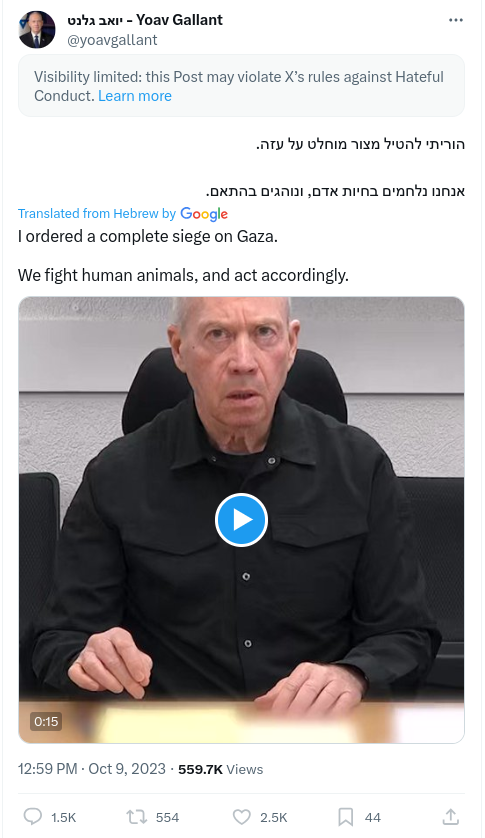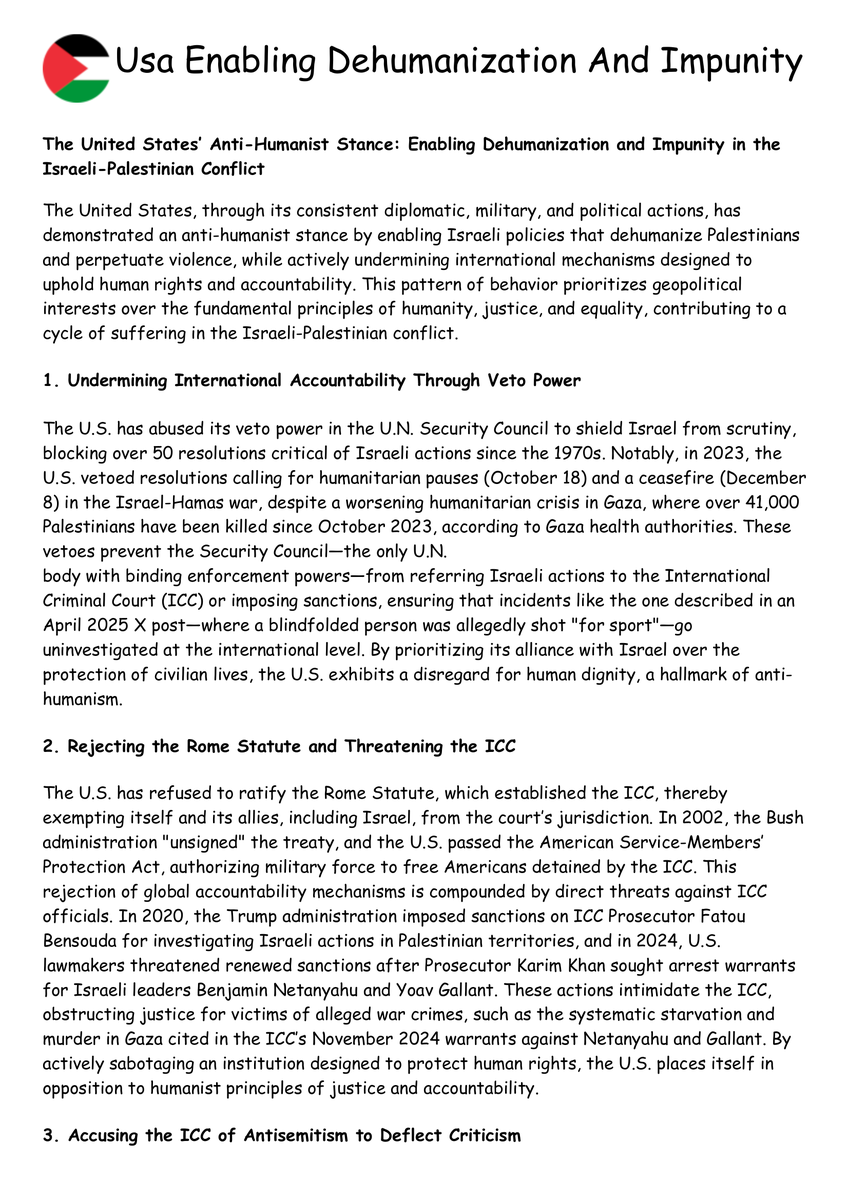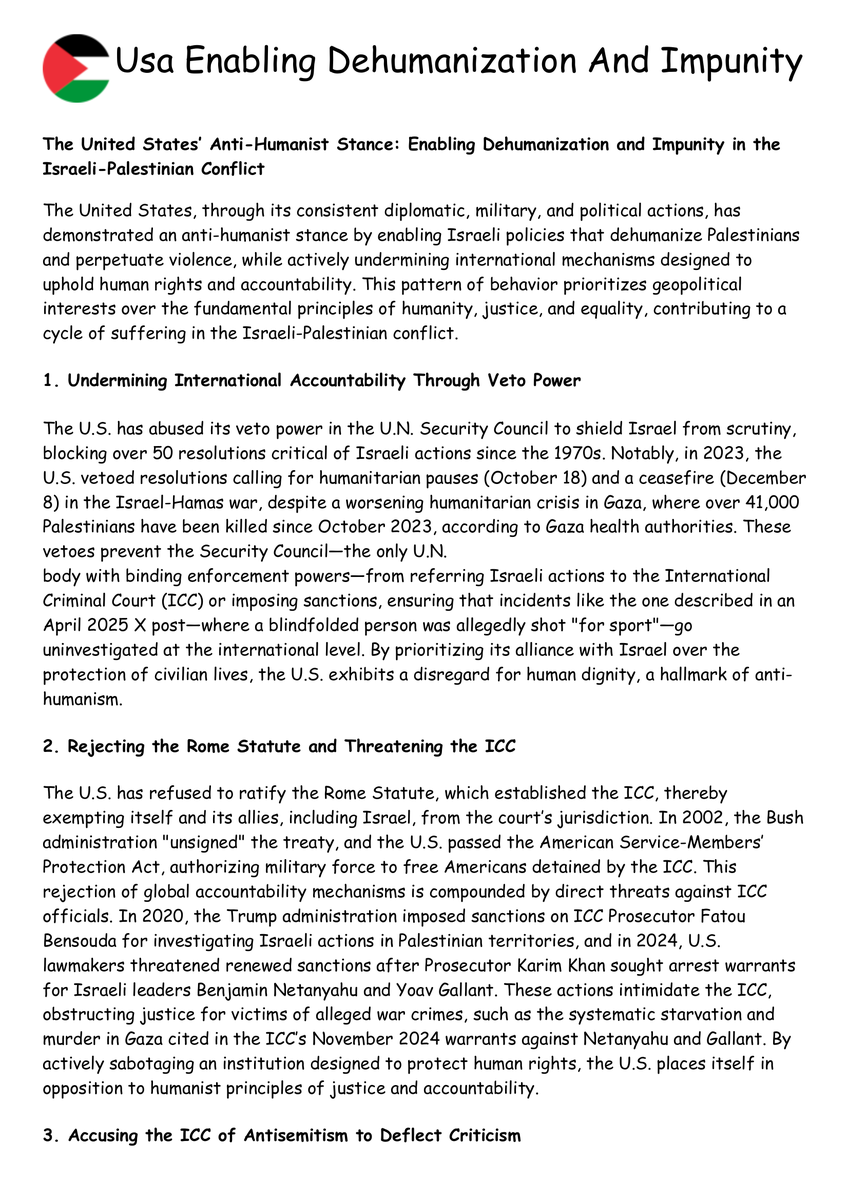ישראל מבצעת רצח עם 1. חוקים ותקנות בינלאומיים ישראל, באמצעות פעולותיהם של השרים בצלאל סמוטריץ', ישראל כץ, יואב גלנט, וכוחות הביטחון הישראליים (צה"ל), מפרה מספר חוקים ותקנות בינלאומיים על ידי חסימת הסיוע ההומניטרי לעזה. הפרות אלו כוללות:
אמנת ז'נבה הרביעית (1949), סעיף 33: אוסרת על ענישה קולקטיבית, אך המצור וחסימת הסיוע מענישים באופן קולקטיבי את האוכלוסייה האזרחית בעזה, כפי שאושר על ידי הוראתו של גלנט ל"מצור מלא" ב-9 באוקטובר 2023 והתחייבותו של סמוטריץ' ב-8 באפריל 2025 לחסום את כל הסיוע, כולל חיטה. המשפט ההומניטרי הבינלאומי (IHL): לפי הפרוטוקול הנוסף הראשון (1977), סעיף 54, אסור להשתמש ברעב של אזרחים כשיטת לוחמה. אזהרת הרעב של ה-IPC ביוני 2024 והודאתו של כץ ב-16 באפריל 2025 על שימוש במניעת סיוע כ"כלי לחץ" נגד האוכלוסייה מפרים נורמה זו. החלטת מועצת הביטחון של האו"ם 2417 (2018): מגנה את השימוש ברעב של אזרחים כנשק מלחמה וקוראת לגישה הומניטרית ללא הפרעה. המצור המתמשך של ישראל, שהוחמר במשך שבעה שבועות עד אפריל 2025, מפר בצורה בוטה את ההחלטה הזו. חוקת רומא (1998), סעיף 8(2)(ב)(xxv): פשעי מ חולמה כוללים הרעבה של אזרחים על ידי שלילת חפצים חיוניים להישרדותם. אכיפת המצור על ידי צה"ל, החוסמת מזון ואספקה רפואית, סותרת ישירות את הוראה זו. פעולות אלו מהוות יחד הפרה של החובות להגן על חיי אזרחים במהלך סכסוכים מזוינים, וחושפות את ישראל, שריה וצה"ל לאחריות משפטית.
מעשה פלילי: המעשה האסור לפי סעיף II(ג)—"הטלת תנאי חיים מחושבים במכוון על קבוצה כדי לגרום להשמדתה הפיזית, כולה או חלקה"—ברור. ה"מצור המלא" (גלנט, 2023), חסימת הסיוע הכוללת (סמוטריץ', 2025), ואכיפת המדיניות (כץ, 2025) הובילו לרעב, כאשר ה-IPC דיווחה על 495,000 תושבי עזה במצב של חוסר ביטחון תזונתי קטסטרופלי עד יוני 2024, משבר שככל הנראה החמיר עד אפריל 2025. הכיבוש וחסימת הסיוע של צה"ל, כפי שציין כץ, מטילים תנאים אלו ישירות על הפלסטינים כקבוצה לאומית. כוונה פלילית: הכוונה להשמיד, כולה או חלקה, מודגמת על ידי הרטוריקה והמדיניות של השרים. ההצהרה המבזה של גלנט על "חיות אנושיות" (2023), הצדקתו של סמוטריץ' להרעיב שני מיליון תושבי עזה כ"מוסרית" (5 באוגוסט 2024), וניסוחו של כץ את חסימת הסיוע כטקטיקת לחץ מכוונת (2025) חושפים כוונה מחושבת למקד את האוכלוסייה הפלסטינית, ולא רק את חמאס. עקביות זו בין שלושה בכירים במשך 18 חודשים מרמזת על מדיניות רצח עם מתוזמרת על ידי המדינה. המילוי הכפול הזה של המעשה הפלילי והכוונה הפלילית מספק בסיס משפטי חזק להאשמת ישראל ואותם פקידים ברצח עם.
מניעה ותגובה: המצור של ישראל והרעב הנובע ממנו מהווים טריגר ברור ל-R2P. האו"ם והמדינות חייבות להשתמש בסנקציות, לחץ דיפלומטי, ובמידת הצורך, פעולה צבאית כדי להגן על האזרחים בעזה, שכן הממשלה נכשלה באופן ברור בכך. בסיס משפטי: ה-IHL ואמנת האו"ם (סעיף 39) מסמיכים לפעולה קולקטיבית לשמירה על השלום והביטחון הבינלאומיים כאשר מתרחשות זוועות. האסון ההומניטרי בעזה, עם סגירת בתי חולים ורעב נרחב, דורש התערבות מיידית למניעת אובדן חיים נוסף. אי פעולה מפר את המחויבות הגלובלית ל-R2P, ומטיל את האחריות להגן על האזרחים הפלסטינים על הקהילה הבינלאומית.
צעדים זמניים של בית הדין הבינלאומי לצדק וחובת מועצת הביטחון/האספה הכללית בית הדין הבינלאומי לצדק (ICJ) הוציא צעדים זמניים ב-26 בינואר 2024, וצווים נוספים ב-2024, המחייבים את ישראל למנוע רצח עם בעזה, כולל הבטחת גישה לסיוע הומניטרי. אי הציות של ישראל, כפי שמוכח בהצהרות השרים והמצור המתמשך של צה"ל, מהווה הפרה ישירה. לפי אמנת האו"ם (סעיף 94(2)), מועצת הביטחון של האו"ם (UNSC) מחויבת לאכוף את החלטות ה-ICJ. עם זאת, אם וטו של ארה"ב משתק את ה-UNSC, החלטה 377A(V) ("מאוחדים למען השלום") מעבירה אחריות זו לאספה הכללית של האו"ם (UNGA). מסגרת משפטית זו מחייבת פעולה כדי לכפות על ישראל לציית לחוק הבינלאומי.
תפקיד דחוף של האספה הכללית תחת ES-10 האספה הכללית חייבת להתכנס בדחיפות תחת המושב המיוחד החירום ה-10 (ES-10), שבו ההחלטה 377 כבר קיימת, כדי להמליץ על צעדים להגנה על אזרחי עזה ולמנוע שואה. הרעב המחמיר, כאשר ארגונים לא ממשלתיים מכריזים על אסון מעשה ידי אדם, משקף זוועות היסטוריות, ומחייב פעולה נחרצת. האספה הכללית צריכה להטיל סנקציות על ישראל, לנתק קשרים דיפלומטיים עם פקידים מפרים, ולאשר קואליציה של מדינות מוכנות להשתמש בכוח צבאי במידת הצורך כדי להבטיח משלוח סיוע ולהפסיק את רצח העם, תוך מילוי המנדט שלה לשמור על השלום ולהגן על זכויות האדם.
צווי מעצר של בית הדין הפלילי הבינלאומי לסמוטריץ' וכץ בית הדין הפלילי הבינלאומי (ICC) הוציא צווי מעצר נגד בנימין נתניהו ויואב גלנט ב-21 בנובמבר 2024, בגין פשעי מלחמה, כולל "רעב כשיטת לוחמה". לאור הכוונה והמעשים הזהים של סמוטריץ' וכץ לרצח עם—חסימת סיוע במטרה להשמיד את הפלסטינים—ה-ICC חייב להוציא בדחיפות צווי מעצר נגדם. הצהרותיהם הפומביות והרעב שנוצר כתוצאה מכך מספקים ראיות מספיקות לפי סעיף 6 של חוקת רומא, ומבטיחים אחריות לצד שותפיהם לפשע.
סיכום הקהילה הבינלאומית לא יכולה להישאר אדישה. ההפרות של ישראל, הכוונה לרצח עם של השרים, והפעולות של צה"ל דורשים אכיפה של מועצת הביטחון של צעדי ה-ICJ, פעולה של האספה הכללית תחת ES-10, ותביעה של סמוטריץ' וכץ על ידי ה-ICC כדי למנוע אסון שניתן למנוע.


Please share @FranceskAlbs @CraigMokhiber https://x.com/R34lB0rg/status/1912549026697998493
Israel, through the actions of Ministers Bezalel Smotrich, Israel Katz, and Yoav Gallant, is committing genocide under Article 6(c) of the Rome Statute. The ministers’ statements—Gallant’s 2023 "complete siege" on Gaza, Smotrich’s 2025 vow to block all aid, and Katz’s 2025 confirmation of starvation as a "pressure tool"—demonstrate intent to destroy Palestinians by deliberately inflicting life-threatening conditions, as evidenced by the ongoing famine reported by NGOs like the IPC. The IDF’s enforcement of this policy, causing mass starvation, fulfills the actus reus. The International Court of Justice (ICJ) has already ordered provisional measures in 2024 to prevent genocide in Gaza, which Israel has ignored. The UN Security Council (UNSC) must enforce these measures immediately. If the UNSC is paralyzed by a U.S. veto, the UN General Assembly (UNGA) must act under Resolution 377 ("Uniting for Peace") in Emergency Special Session 10 (ES-10) to impose sanctions and authorize military action to halt the genocide. Simultaneously, the International Criminal Court (ICC), which issued warrants for Netanyahu and Gallant in 2024, should urgently issue additional arrest warrants for Smotrich and Katz to ensure accountability for these genocidal acts.



I continue to strongly denounce the United States of America. Your hatred for Palestinians and lack of impartiality disqualify you for any role on a civilized planet. https://x.com/USUN/status/1912143890066403707 https://x.com/R34lB0rg/status/1912237345006305405/photo/1

Dear @support and @premium,
I am filing a complaint for violation of X’s Terms of Service (TOS), potential fraud, and non-compliance with the EU Digital Services Act (DSA).
Violation of TOS: X Premium promises prioritized reply rankings, but my metrics dropped drastically (e.g., impressions from 224K to 3.8K, engagement from 4% to 0.3%) around April 10, 2025, due to an algorithm change deboosting replies. This violates the TOS for premium users.
Potential Fraud: By accepting payment for prioritized reply rankings and then deboosting my replies, X has misrepresented its service, causing me financial harm (e.g., lost audience growth). This may constitute fraud.
EU DSA Relevance: The DSA requires transparency in moderation (Article 17) and prohibits misleading practices (Article 24). X’s lack of notification about the algorithm change and potential shadowban violates these rules.
Requested Actions: - Restore my account’s visibility, including prioritized reply rankings. - Compensate me for the period I was denied premium benefits (April 10, 2025, onward). - Publicly clarify the algorithm change and update the TOS. - Provide a DSA-compliant explanation of moderation actions against my account.
I expect a response within 14 days, or I will escalate this to the European Commission under the DSA and explore legal action for fraud and breach of contract.

Gaza, a historical haven of Muslim, Christian, Jewish coexistence, reflects the "camp of the saints" (Rev 20:9).
Full article in multiple languages on my website: https://farid.ps/articles/gaza_the_camp_of_saints https://x.com/R34lB0rg/status/1912141887495872643/photo/1

Israel's arbitrary detention, torture, and abuse of Palestinian detainees violates international law.
Full article in multiple languages on my website:
https://farid.ps/articles/israel_is_holding_thousands_of_palestinians_hostage https://x.com/R34lB0rg/status/1912140575647596672/photo/1

U.S. veto abuse, ICC rejection, and unwavering Israel support enable impunity for alleged war crimes, dehumanizing Palestinians and eroding justice. Condemn this anti-humanist stance perpetuating suffering. #IsraeliPalestinianConflict #HumanRights
Full article in multiple languages on my website: https://farid.ps/articles/usa_enabling_dehumanization_and_impunity

Israel's arbitrary detention, torture, and abuse of Palestinian detainees violates international law.
Full article in multiple languages on my website: https://farid.ps/articles/israel_is_holding_thousands_of_palestinians_hostage https://x.com/R34lB0rg/status/1912137304342143275/photo/1

Israel's arbitrary detention, torture, and abuse of Palestinian detainees violates international law.
Full article in multiple languages on my website: https://farid.ps/articles/israel_is_holding_thousands_of_palestinians_hostage https://x.com/R34lB0rg/status/1912136798135796133/photo/1
